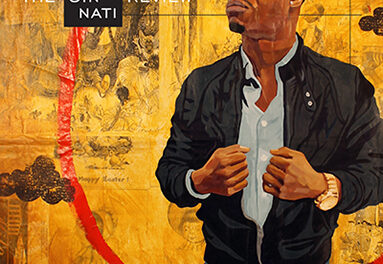
There’s nothing much wrong with the Bridgeway Motor Court. The carpet in Coleman’s room is dappled with burn marks, and the exterior wall, the one with the windows, has these psychedelic zigzags at the bottom, like somebody’s kid was left to run their crayons back and forth over the same spot, rubbing them down to the nubs. It’s cheap, though, the motel, and there aren’t any bugs. Since his wife kicked him out eight months ago, he’s seen far worse.
At first, he’d spent nights at shelters or in the cab of his pickup, his clothes and tools locked down in the covered bed. Then a space opened up in a sober house downtown. The owner was a lawyer with connections in the probation department. He helped some of the guys with their cases. Or gave them drugs. Especially the younger guys, the pretty ones. I take care of you, you take care of me, that was his motto. Two weeks and Coleman was out of there.
For a little while, he was crashing with a buddy, a roofer with a spare room. The guy had this wallpaper in his bathroom, dogs playing poker. He must have thought it was funny, but every time Coleman went in there it made him gag, a furry paw to the back of his throat. Plus, he got tired of the bad nights: listening to the same stories over again, cleaning the guy’s vomit off the toilet or the bathroom floor, putting him to bed.
So, the Bridgeway Motor Court.
In his room, he irons a pair of khakis and a polo shirt that says Apex Hardware on the front. He has a date tonight. On first dates, he likes to get there early, to be already seated in a booth if it’s a restaurant. If it’s a movie theater, he stands in the lobby, tickets in hand. He’s been off the crutches since January, but there’s still the limp. He doesn’t like the idea of his date seeing him come through the front door half-lame, dragging one leg behind him.
He hasn’t been dating long. Only four times since the separation, all through an app. Five if you count the one who stood him up. There was a college girl who’d left flirty comments on his pictures. They texted back and forth, and when it was time to meet, she made all the arrangements. He had never seen anyone walk like that—a rapid trot, self-consciously cute, as if her ankles were bound together by a short length of elastic cord. At the BBQ place, she’d ordered a lot of food and then, as he was taking care of the check, she asked the waiter to pack most of it up. He walked her to the MAX stop. She boarded the train carrying styrofoam containers filled with pulled pork, hush puppies, and fried okra. He never heard from her again.
Then there was the wide-hipped woman with bleached bangs. They’d had dinner outside on the patio at Stormbrewer. The woman said, As a fat girl, it’s kind of over the top for me to wear lipstick—like an unfair advantage. I have these big plump lips.
She smoked cigarette after cigarette, reapplying burgundy lipstick after each one, delighted by the red-painted filters as they piled up in the ashtray. She was funny and frank, and he liked her. In her profile, she’d said she was a social drinker. But while he sipped Coca-Cola, crunching at the ice with his teeth, she kept ordering whiskey sours, one after another.
You really don’t drink? she asked.
I can’t, he said. Not anymore.
*
Tonight, he is meeting his date at a diner, a Greek place that serves breakfast all day. In the display window a column of sliced meat turns slow circles. A song is playing, something about a laser in the night. He hasn’t heard the song in thirty years, but then today, twice. He wonders if it’s some kind of tribute, if maybe the singer has just died.
He orders a coffee and waits. The guy in the next booth is a loud talker; he asks the waitress where she’s from.
Baltimore, she says and slides an omelet in front of him.
Did you like it there?
Hated it.
Nice train station, the guy says, as if that alone redeemed a place.
Coleman checks his wristwatch against the clock in the diner. He has to wind it often, or it runs slow. He spotted it one afternoon in a pawnshop window. It was silver colored, like the coin he’d gotten at his first meeting, his twenty-four-hour chip. The chip didn’t mean much to him, but something about the watch—this ordinary, tarnished thing—it gave him chills. It seemed to be singing to him from behind the pawnbroker’s glass.
My higher power, it can be anything? he asked at his next meeting.
Anything, they said.
The watch, then. Mine is the watch.
*
His date, Sandra, jangles through the front door and throws herself into his booth. Her hair is long and curly. Damp, it rests on her shoulders in thick, wet strands. She’s breathing hard, like she just ran from somewhere.
I’m sorry I’m late, she says. It’s my house, it’s so haunted.
The waitress brings their menus. He already knows what he’s getting (the baked lamb), but Sandra turns each of the laminated pages, squints at the pictures of food. A couple of her fingers look badly bruised. Smashed.
What happened there?
She sighs, regarding her hand. Do you believe in ghosts?
I’m not sure, maybe.
My house. Really, it’s my sister’s place. There’s a ghost, maybe more than one. Like tonight. I was getting ready, and the thing slams a door on my hand. Bam!
Sandra slaps the table with the flat of her good hand. The silverware clatters, and the loudmouth in the next booth lets out a little shout—Ooo boy! Something like that.
Show me, he says.
Sandra holds up the injured hand. Between the first and second knuckle, her ring finger is purplish pink, darkening as it nears the tip. The pad is a shiny gray, almost black, as if it’s been freshly inked.
Can you wiggle it?
The finger moves stiffly, and Sandra winces, waves it in the air.
I think it’s broken, he says.
Are you sure?
Pretty sure. I used to work construction. New guys are always smashing their hands with hammers. That finger, that looks broken to me.
Shit, she says.
When the waitress comes to take their order, he asks for a bag of ice.
*
They eat dinner in the emergency-room waiting area. There are signs prohibiting smoking, but nothing about food. A man with a round florid face is giving them dirty looks, his hand over his belly, as if he’s trying to keep his guts from spilling out. Coleman ignores him, goes back to sawing at his lamb with a plastic knife.
You probably think I’m crazy, Sandra says.
He chews, considering. I think you’re hurt. I guess it doesn’t really matter how it happened.
You’ve never seen a ghost, then, nobody in your family? The night my grandmother died, her ghost appeared in my sister Liz’s bedroom. She was in bed with her husband. A Black man. Nana hadn’t approved of the marriage, but that night she said she’d been wrong, that they had her blessing. Walter saw it too, said he’d never been so scared in his whole life.
Coleman hardly ever talks about the Watchman. But this, he figures, is a special circumstance. When I was a kid, he says finally, I was in a car accident. There was this man, he just showed up out of nowhere, and he saved me.
He’d been five years old at the time, playing outside, rolling over and over down the slope of his front yard. Grass stained his knees, and his hands stank of dandelion stalks.
He doesn’t remember climbing into the family car, only the vinyl’s sticky heat. On his knees in the front seat, he tapped on the faces of the dials, twisted the knobs, pulled the levers. The car creaked and began to move, drifting backward down the long driveway. Tires gnashed the gravel, and little rocks ticked beneath him. The yard, his house, they began to slip away. The way he remembers it, there were tracers, like the time he did LSD. The car was moving; so were the bushes by the roadside, the woods behind. All this moving, but Coleman couldn’t move. It was like being in a dream.
He shut his eyes, and when he opened them again, he was not alone in the car. There was a man in the driver’s seat, a watch loose on his wrist. Coleman tried to look at the man, but a bolt of sunlight flared off the watch’s face and struck his eyes. The steering wheel jerked to one side, and the car veered into a ditch.
That’s all he remembers before the hospital. They’d pulled three broken teeth from his jaw. New ones grew in to replace them. After the accident, he knew he would never die. At least not until he was very old. Something was looking out for him, shielding him from harm. He could do whatever he wanted.
That’s amazing, Sandra says. And no one else saw him?
We were out in the sticks. There was nobody around.
Sandra sets the plastic bag from the diner onto a little table built into the row of chairs. The bag says THANK YOU THANK YOU THANK YOU, and what’s left of the ice sloshes around inside.
She says, You can go if you want to. It was really sweet of you to take me, but I think it’s going to be a while. With her good hand, she takes a couple of fries from the container in her lap. Bet this wasn’t how you saw your Friday night going.
I’ve had worse, he says, grinning. How’s the finger?
About the same. Aspirin isn’t doing much good.
Sandra holds up the hand. Two of the fingers are bound together with medical tape from the first aid kit he keeps in his truck. The ring finger looks wider than the others; the palm has begun to swell.
. . .










